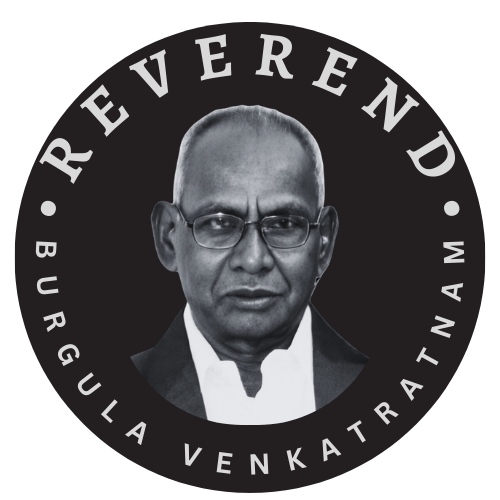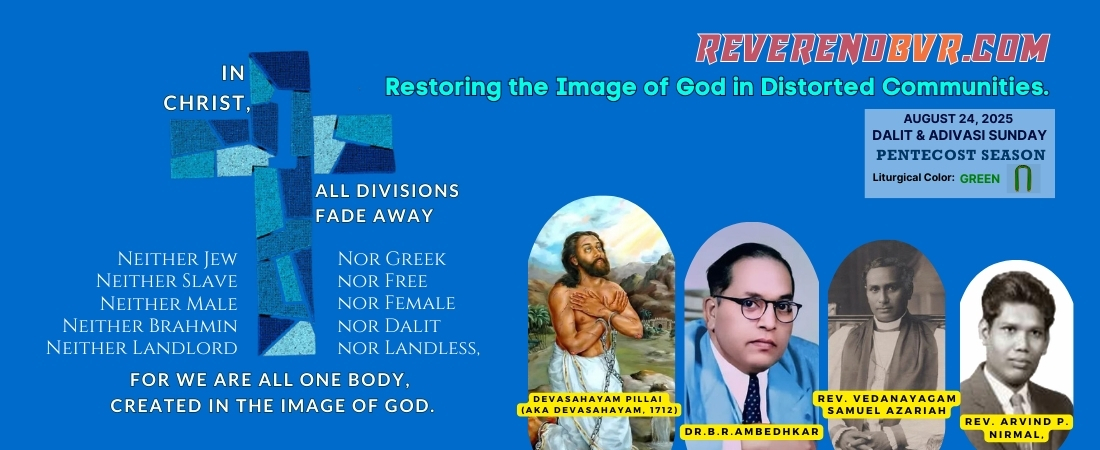On this Dalit and Adivasi Sunday, we confront the painful reality of caste-based exclusion within the Church and proclaim the liberating Gospel truth that in Christ, every person—regardless of caste or status—is fully restored in the divine image (imago Dei). Justice, mercy, and humility call us to dismantle oppressive hierarchies and live out a faith that truly heals and empowers distorted communities.
Sermon for Dalit and Adivasi Sunday
Theme: Restoring the Image of God in Distorted Communities
Date: Sunday, June 22, 2025
Textual References: Micah 6:1–8 | Psalm 113:1-9 | Galatians 3:18–29 | Luke 4:16–21.
Original Language Reflections (For deeper study, see Section 2 in the sermon): Refer Table explaining Hebrew & Greek Words.
Website: www.reverendbvr.com
1.Introduction: A Cry for Justice, A Call to Dignity
In the heart of Scripture beats a pulse for justice. From the prophetic cries of Micah to the radical inclusivity of Paul’s vision in Galatians, the God of the Bible is a God who sees, lifts, and restores. This Sunday, as the Church of South India (CSI) recognizes Dalit and Adivasi Sunday, we join the global chorus that seeks to restore the image of God in distorted and dehumanized communities. This restoration is not merely a social concern; it is a theological imperative. The term Dalit means “broken,” and Adivasi refers to the “original dwellers”—both representing peoples who have endured centuries of caste-based discrimination, displacement, economic marginalization, and cultural erasure. Yet the Gospel, in its radical vision, proclaims their full humanity, their dignity, and their restoration in Christ.
Despite the liberating message of the Gospel, the Indian Church has not remained untouched by the caste system. In regions like Goa and Tamil Nadu, caste identities from Hindu society were often carried into Christian communities in Roman Catholics. Brahmin converts became Christian Bamonns, Kshatriyas became Chardos, and Dalits remained marginalized—often assigned new Christian identities but not new social status. This inherited hierarchy within the body of Christ stands in contradiction to the radical equality proclaimed in Galatians 3:28. On this Dalit and Adivasi Sunday, we must confront the uncomfortable truth: that casteism is not only a social evil but a theological heresy, a denial of the imago Dei in every person. The Church’s witness depends on its willingness to dismantle these hierarchies in both liturgy and life.
I. Micah 6:1–8: The Lord’s Lawsuit Against Injustice
Micah 6 offers a profound juridical metaphor: God brings a lawsuit against His people. This courtroom drama begins with a divine interrogation: “My people, what have I done to you? How have I burdened you? Answer me.” (Micah 6:3). God reminds Israel of their liberation from Egypt—a central event of emancipation. This is the Exodus motif, foundational for all liberation theologies. It is not merely history; it is the grammar of divine justice. God does not forget the oppressed. The climax comes in verse 8: “He has shown you, O mortal, what is good. And what does the Lord require of you? To act justly and to love mercy and to walk humbly with your God.” Here we see the ethical triad: justice (מִשְׁפָּט / mishpat), mercy (חֶסֶד / chesed), and humility. This is God’s call to communities complicit in systems of oppression. God demands not burnt offerings, but ethical reformation.
For distorted communities such as Dalits and Adivasis, this verse is a rallying cry. And for dominant communities, it is a summons to repentance.
II. Psalm 113: A Theology from the Dust
Psalm 113 presents a God who raises the poor from the dust and lifts the needy from the ash heap (v.7). The Hebrew term for “poor” is דָּל (dal), and the “ash heap” is אֲשְׁפֹּת (ashpot) evokes the image of a garbage dump—abandonment, exclusion, waste. This is the divine reversal—the theological grounding for restoration. God not only notices the poor; He enthrones them:
“He seats them with princes, with the princes of his people.” (v.8) This language is not metaphorical sentimentality; it is a declaration of social and eschatological upheaval. The God of Israel reorders hierarchies.
Dalits and Adivasis, systematically pushed to the margins, are seen in this psalm as those whom God will lift up. Their restoration is not charity—it is God’s justice at work.
III. Galatians 3:26–29: Baptized into a New Identity
Paul’s epistle to the Galatians dismantles social hierarchies through the lens of baptism: “There is neither Jew nor Gentile (ἔθνος / ethnos), neither slave (δοῦλος / doulos) nor free, nor is there male and female, for you are all one in Christ Jesus.” (Gal. 3:28)
In the Greco-Roman world, identity was rigid—defined by birth, class, and ethnicity. Yet Paul’s vision is radically counter-cultural: in Christ, the oppressive boundaries are dismantled. This is not a flattening of difference but a refusal to allow difference to become a basis for domination.
In the Indian context, caste must be added to Paul’s list: There is neither Brahmin nor Dalit, neither landlord nor landless, for all are one in Christ.
This is not mere theological abstraction. It speaks directly to ecclesial structures: are our pews and pulpits still divided by caste and class? The Gospel demands a new anthropology—one that reflects the imago Dei (Image of God) in every person, regardless of social location. For Paul, this is grounded in δικαιοσύνη (dikaiosynē)—righteousness and justice—and sealed in our identity as υἱός (huios), children of God (Gal. 3:26).
IV. Luke 4:16–21: The Nazarene Manifesto
In Jesus’ first sermon at Nazareth, he reads from Isaiah: “He has anointed me to proclaim good news (εὐαγγελίζω / euangelizō) to the poor (πτωχός / ptōchos)… to set the oppressed free (ἐλευθερόω / eleutheroō).” (Luke 4:18)
This is not only a spiritual mission—it is a social declaration. Jesus roots his ministry in liberation theology. He identifies the poor (ptōchoi), the blind (τυφλός / typhlos), the captives (αἰχμάλωτοι / aichmalōtois), and the oppressed (θραύω / thrausō) as central to the Kingdom of God.
By ending with “Today this Scripture is fulfilled in your hearing,” Jesus declares that restoration is not postponed—it begins now. For Dalit and Adivasi communities, Jesus’ proclamation is a Messianic affirmation: their suffering is seen, and their freedom is God’s mission. In this, Jesus mirrors the ἔλεος (eleos)—mercy—that echoes the ḥesed of the Hebrew prophets.
V. Theological Reflections: Restoring the Image of God
The restoration of distorted communities is not a project of pity, but of prophecy. To be created in the image of God (Imago Dei) is to carry inherent dignity (Genesis 1:26–27). Oppressive systems like casteism, tribal displacement, and economic exclusion distort this image.
The Church is called to be a restorative community—not merely a worshipping body, but a liberating body. Worship without justice is idolatry (Isaiah 1:13–17). The Eucharist shared in a divided church is a contradiction to the Gospel (1 Corinthians 11:17–22).
Restoring the Image of God requires:
- Reimagining theology from the perspective of the oppressed.
- Dismantling structural casteism within church leadership.
- Empowering indigenous and Dalit voices in biblical interpretation.
- Participating in solidarity actions—education, legal aid, land rights, and representation.
VI. Motivational Exhortation: What Can We Do?
- Listen deeply to Dalit and Adivasi narratives without defensiveness.
- Teach theology from the margins—include Ambedkar, Periyar, and Dalit theologians like Arvind P. Nirmal.
- Examine our churches—who leads? Who serves? Who is heard?
- Celebrate cultural identities of Adivasi communities in liturgy, music, and leadership.
- Practice what Micah demands: Act justly (ṣedeq), love mercy (ḥesed), and walk humbly (ʿānāw).
Conclusion: A Church That Heals
We are not called to preserve the status quo. We are called to live the Gospel that liberates. If we remain silent while distorted communities suffer, we distort the face of Christ Himself.
The God who raised the poor (דָּל – dal) from the ash heap (עָפָר ʿāphār) in Psalm 113, the Christ who broke every boundary in Galatians, and the Spirit who anointed Jesus to set captives free—this Triune God calls us to be agents of restoration.
Let us respond, not with mere rituals, but with transformed lives and communities.
Closing Prayer
God of the oppressed and Liberator of the forgotten,
You called Moses, Miriam, and Aaron to lead slaves to freedom.
You spoke through prophets who cried out against injustice.
You raised the poor from the dust and seated them with princes.
You sent your Son to proclaim good news to the poor and set the oppressed free.
Today, we confess our complicity in systems that distort your image in others.
Give us eyes to see, hearts to repent, and hands to restore.
May your Church become a sanctuary of dignity,
where Dalits and Adivasis are not merely included,
but empowered, honoured, and uplifted.
Make us doers of justice, lovers of mercy,
and walkers in your humble path.
In the name of the Liberating Christ, we pray, Amen.
“Let justice roll on like a river, righteousness like a never-failing stream.” – Amos 5:24
2. Learn Words from the Original Scriptures (For deeper understanding and meditation on today’s theme) :
| S.No | Word | Language | Meaning/Usage | Scriptural Context |
| 1 | צֶ֫דֶק (ṣedeq) | Hebrew | Righteousness, justice | Micah 6:8 |
| 2 | חֶ֫סֶד (ḥesed) | Hebrew | Mercy, steadfast love, covenantal loyalty | Micah 6:8 |
| 3 | עָנָו (ʿānāw) | Hebrew | Humble, meek | Micah 6:8 (walk humbly) |
| 4 | דָּל (dal) | Hebrew | Poor, weak, lowly | Psalm 113:7 |
| 5 | עָפָר (‘āphār) | Hebrew | Dust, ashes – symbol of extreme poverty or mortality | Psalm 113:7 |
| 6 | ἔλεος (eleos) | Greek | Mercy, compassion | Echoes Hebrew ḥesed in New Testament (e.g., Lk 1:50) |
| 7 | δικαιοσύνη (dikaiosynē) | Greek | Righteousness, justice | Galatians 3:21; echoes ṣedeq |
| 8 | ἐλευθερόω (eleutheroō) | Greek | To liberate, set free | Luke 4:18 (release the oppressed) |
| 9 | πτωχός (ptōchos) | Greek | Poor, destitute, helpless | Luke 4:18 |
| 10 | εὐαγγελίζω (euangelizō) | Greek | To proclaim good news | Luke 4:18 |
| 11 | ἔθνος (ethnos) | Greek | Nation, people group | Galatians 3:28 – Jew or Greek |
| 12 | δοῦλος (doulos) | Greek | Slave, bondservant | Galatians 3:28 |
| 13 | υἱός (huios) | Greek | Son, child | Galatians 3:26 |
Bibliography
- Arvind P. Nirmal, Towards a Christian Dalit Theology
- Gustavo Gutiérrez, A Theology of Liberation
- M.M. Thomas, The Acknowledged Christ of the Indian Renaissance
- Veli-Matti Kärkkäinen, The Doctrine of God: A Global Introduction
- James H. Cone, The Cross and the Lynching Tree
- Sathianathan Clarke, Dalits and Christianity: Subaltern Religion and Liberation Theology
- Samuel Rayan, Justice: The Biblical Vision
- The Holy Bible, NIV and Hebrew-Greek Interlinear Texts
© 2025 ReverendBVR.com | High-Academic Sermon Series, 2025.
Content licensed under Creative Commons Attribution-NonCommercial-NoDerivatives 4.0 International (CC BY-NC-ND 4.0). You are free to share — copy and redistribute the material in any medium or format with proper attribution. No commercial use or modifications allowed without explicit permission.
For further sermons and biblical reflections, please visit 🌐 www.reverendbvr.com/sermons

